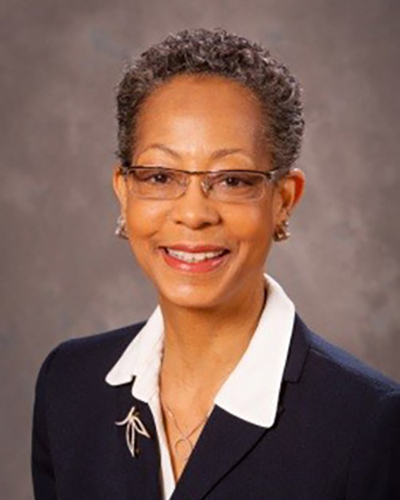Education
Karen Aldridge-Eason earned a Bachelor of Arts in education from the University of Michigan in 1980, and received a master’s in public administration from Western Michigan University in 1985.







Karen Aldridge-Eason earned a Bachelor of Arts in education from the University of Michigan in 1980, and received a master’s in public administration from Western Michigan University in 1985.
Service was a fundamental part of Aldridge-Eason’s childhood — her father was a pastor, and her mother was a teacher and a principal. Growing up in Flint, Michigan, she was aware of the work of the Charles Stewart Mott Foundation at a young age. Early in her career, Aldridge-Eason served as a missionary in western Africa, before returning to Michigan and finding a position in the state government.
Aldridge-Eason worked as a legislative assistant in the Michigan Senate before becoming the deputy director of a state department budget office within the executive branch. In 1988, Aldridge-Eason became budget director for her hometown of Flint, and in 1992, returned to the state budget department. In 1994, Aldridge-Eason began working for the Mott Foundation as program director for the newly formed Flint program area. In 2003, she was “loaned” by the foundation to become the first foundation liaison for the governor’s office. Aldridge-Eason was then invited to apply for the position based on her extensive experience in both government and the nonprofit sector.
I saw foundation staff who were very humble and understand that it wasn’t about them and they were privileged to be able to do this work and others who you would have thought it was their money, and who treated people with what I saw to be not very much respect in the nonprofit sector. So in my own work doing local grantmaking, I really worked on listening to our grantees and our community to do the work and being willing to hear what they had to say, even if I couldn’t be responsive to it all the time.
The governor’s Office of Foundation Liaison (OFL) is a novel organization that facilitates relationships and creates opportunities for partnership among foundations, and between foundations and the state government. OFL, which has flourished under the direction of Aldridge-Eason, is the first of its kind and has since served as a model for similar organizations nationwide. OFL was created in response to the economic downturn in the state of Michigan as a way to increase the efficiency and thoroughness of community support through the nonprofit sector. Since its inception, OFL has connected more than $100 million from foundations to state initiatives including reforms in K-16 education, economic and workforce development, health, early childhood, and land use.
OFL brought together foundations, school leaders, and government officials in a collaborative effort to found the Early Childhood Investment Corporation, which was then instrumental in creating the Office of Great Start. Another success of OFL has been its involvement with the Michigan College Access Network, where it used foundation grants to leverage matching support from the U.S. Department of Education, equaling $25 million.
We are here to work on strategic partnerships between government and philanthropy with the intent to move and change systems to better serve Michigan residents. Changing systems often means changing policies. So we are interested in policy reforms that better, that improve, the lives of Michigan residents.
Aldridge-Eason was influential as a facilitator when the state created the country’s first nationally funded Prisoner Re-Entry Initiative. This program was a partnership between local and national foundations and the Michigan Department of Corrections, and demonstrated Aldridge-Eason’s ability to form relationships and build trust between various parties based on their similar goals and initiatives.
Aldridge-Eason chaired the board of directors at Genesys Health Systems, served on the board at both Altarum Institute and Tapology, Inc., and was a member of ABFE. She was a member, fellow, treasurer, director, or coordinator with a vast number of nonprofit organizations including, but certainly not limited to, the Michigan Public Health Institute, Michigan Community Service Commission, Baptist World Alliance, Big Brothers/Big Sisters, Flint Youth Service Corp., Flint Young Women’s Christian Association, and the American Society for Public Administration.
Aldridge-Eason was interviewed regarding insights and experiences in working with Michigan’s philanthropic community and the Our State of Generosity (OSoG) partners. The following quotes relate to the five organizing themes of the OSoG project.
Philanthropy and Public Policy
Foundations sometimes struggle with this notion – they don’t want to be seen as influencing policy, but we talk all the time about wanting to change systems, then you have to understand its policies that create systems.
Practical Wisdom
A couple of things. Don’t expect miracles [laughs] in the first year or so. It takes time. This is about building relationships and creating opportunities, [with] a partner where you have a shared interest or shared vision. Foundations and government have to be able to give a little for effective partnership, and knowledge can be just as valuable as dollars.
I think Michigan has been willing to be maybe a little bolder and a little more proactive than some other places, around using its instruments of wealth and knowledge to make our state better. I think just as Michigan was an innovator in manufacturing and the auto industry, I think we [have] been innovators around philanthropy and partnerships with our nonprofit sector, with government and recognizing — you know Rob [Collier] will say over and over again — all of Michigan philanthropy can’t save the state budget. It would fund one of the programs of state government for a day or two at best. So I think our willingness to see ourselves as a part of a larger environment that, you know, requires us to work together.
Council of Michigan Foundations. (n.d.). Governor’s Office of Foundation Liaison. https://www.michiganfoundations.org/advocacy/governors-office-foundation-liaison
Council of Michigan Foundations. (2015, July). Office of Foundation Liaison fact sheet. https://www.michiganfoundations.org/resources/office-foundation-liaison-fact-sheet